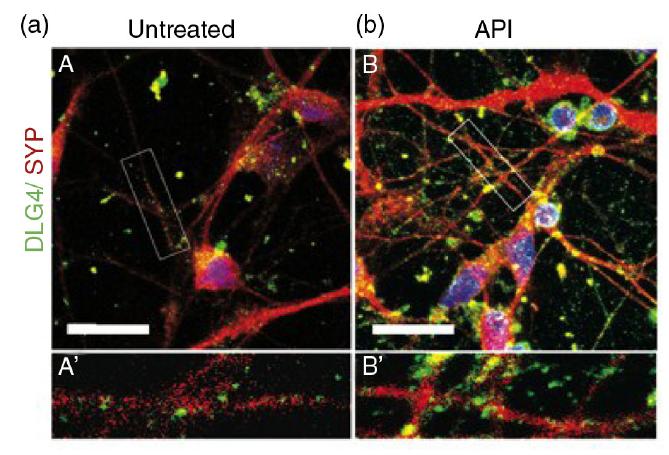Plant compound found in spices and herbs increases brain connections

The neurons treated with apigenin (right) show more formation of synapses (red) than the neurons that were not treated. Credit: Rehen et al.
Brazilian researchers from D'Or Institute for Research and Education (IDOR), Federal University of Rio de Janeiro (UFRJ) and Federal University of Bahia (UFBA) have demonstrated in laboratory that apigenin, a substance found in parsley, thyme, chamomile and red pepper, improves neuron formation and strengthens the connections between brain cells.
Previous experiments with animals had already shown that substances from the same chemical group as the apigenin, known as flavonoids, positively affect memory and learning. Many studies highlight the potential of flavonoids to preserve and enhance brain function.
While the effectiveness of flavonoids for brain health is not an entirely new concept, this research is the first to show the positive effects of apigegin directly on human cells and the first to unraveling its mechanism.
The scientists observed that just by applying apigenin to human stem cells in a dish they become neurons after 25 days – an effect they would not see without the substance. Moreover, the neurons that were formed made stronger and sophisticated connections among themselves after being treated with this natural compound.
“Strong connections between neurons are crucial for good brain function, memory consolidation and learning”, says neuroscientist from IDOR and UFRJ Stevens Rehen, leader author of the paper published today at Advances in Regenerative Biology.
The research team conducted by Rehen demonstrated that apigenin works by binding to estrogen receptors, which affect the development, maturation, function, and plasticity of the nervous system. This group of hormones is known to delay the onset of psychiatric and neurodegenerative disorders such as schizophrenia, depression, Alzheimer's and Parkinson's disease. However, the use of estrogen-based therapies is limited by the increased risk of estrogen-dependent tumors and cardiovascular problems.
Researchers believe apigenin can be used as an alternative approach on future treatments for neurodegenerative diseases as well as in neuronal differentiation strategies in laboratory.
“We show a new path for new studies with this substance”, points out Rehen. “Moreover, flavonoids are present at high amounts in some foods and we can speculate that a diet rich in flavonoids may influence the formation of neurons and the way they communicate within the brain.”
###
The study was part of the Phd dissertation of Cleide Souza, at the Program on Morphological Sciences of UFRJ and received financial support from the Brazilian agencies FAPERJ, CNPq, CAPES, BNDES and FINEP.
About the IDOR
The D'Or Institute for Research and Education is a nonprofit organization which aims to promote scientific and technological progress in healthcare through research and education. IDOR was established in 2010 in Botafogo, Rio de Janeiro, Brazil. Since then, the institute is responsible for designing, planning and overseeing most of the educational and research activities conducted by its sponsor, one of the most important hospital groups in Brazil, the Rede D'Or São Luiz. Our main areas of research are neurosciences, oncology, intern medicine, intensive medicine and pediatrics.
Media Contact
All latest news from the category: Health and Medicine
This subject area encompasses research and studies in the field of human medicine.
Among the wide-ranging list of topics covered here are anesthesiology, anatomy, surgery, human genetics, hygiene and environmental medicine, internal medicine, neurology, pharmacology, physiology, urology and dental medicine.
Newest articles

Silicon Carbide Innovation Alliance to drive industrial-scale semiconductor work
Known for its ability to withstand extreme environments and high voltages, silicon carbide (SiC) is a semiconducting material made up of silicon and carbon atoms arranged into crystals that is…

New SPECT/CT technique shows impressive biomarker identification
…offers increased access for prostate cancer patients. A novel SPECT/CT acquisition method can accurately detect radiopharmaceutical biodistribution in a convenient manner for prostate cancer patients, opening the door for more…

How 3D printers can give robots a soft touch
Soft skin coverings and touch sensors have emerged as a promising feature for robots that are both safer and more intuitive for human interaction, but they are expensive and difficult…





















